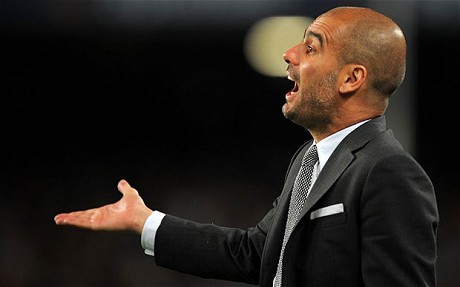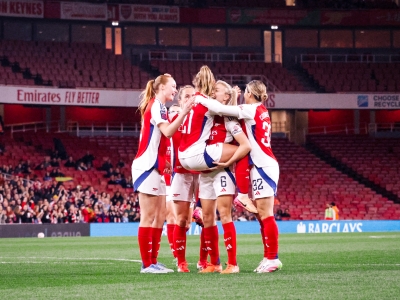What do you get the man who has everything? A life spent in a beautiful Mediterranean coastal city, a global leader in your chosen profession by the age of 40, an output of quality from your product rarely, if ever, witnessed at any other time, the adoration of 100,000+ on a weekly basis and the figurehead of an institution that is the embodiment of a nation of seven million people without an independent state of their own. The 40-year-old Catalan hero, however, is seemingly bored with paradise and has refused to speak on his future beyond the expiry of his current contract in 2012. Paradise is also not without its own problems – the financial implications of maintaining the dream team mean that Barcelona have a considerable cash flow problem. There have also been reports that Pep is tiring of the stress of managing the Catalan super club as well as the lack of autonomy that comes from managing in Spain. Also, how does one top Saturday night’s Wembley victory?
Pep has long harboured a desire to come to the Premiership, as far back as the tail-end of his playing career, when his wish had been to wind down his career at Arsenal whilst acquiring further knowledge from Arsène Wenger in preparation for a career in management. This wish never materialised, nor did anything come from trials at Man City and Wigan. However the wish to move to England is still no doubt a part of Guardiola’s future plans. On this front, however, Arsenal face stiff competition. Sir Alex Ferguson will not go on forever at Old Trafford, Abramovich sees Pep as his prime target to replace Ancelotti at Chelsea, and the Petro-Dollars of the Middle Eastlands may also swoop should Roberto Mancini fail to live up to the sky-high expectations that follow City’s FA Cup win and Champions League qualification.
The case in Favour of Pep Guardiola
The brand of football shown by Barcelona is not a million miles away from what Wenger has tried to achieve at Arsenal over the last 15 year. In fact, it has greatly influenced Pep’s style of football. It is widely recognised that Guardiola is a big fan of Arsenal’s style of play. Also, watching Barcelona is a lot like watching a version of Arsenal that actually knows how to win things and has some of Arsenal’s faults ironed out with a bit of steel added to the silky play – can you imagine an Arsenal side with the determination to win back possession of the ball that Barcelona display?
Also, the conditions at Arsenal favour Guardiola far more than those at our rivals. Despite Abramovich’s strong desire for Guardiola and his style of play, the liberal use of the axe at Stamford Bridge that has seen the likes of Mourinho and Ancelotti sacked after a solitary season of failure (relative or otherwise), regardless of previous achievement, is largely the self-same culture from which Guardiola would be seeking refuge in the Premiership. While Guardiola is tiring of being subordinate to the whim of an elected Barcelona president, at Stamford Bridge he would be subordinate to the tyranny of Roman Abramovich – a clear example of the worst of both worlds if ever there was one. If past conduct is anything to go by, the Arsenal board - in contrast - offers a degree of autonomy of which Guardiola can at present only dream.
Apparently Guardiola is also not greatly excited at the thought of stepping into Sir Alex Ferguson’s shoes either, and who could blame him? Aside from replacing a Legend who will no doubt, when the time comes, be leaving Old Trafford on a high, United - like Barça - have their own financial problems and greatly need to replace a few key personnel at the tail-end of their careers. Of last season’s top four sides, Arsenal no doubt have the strongest financial circumstances to adapt to the post-UEFA Fair Play world come 2013 and are either producing or have purchased some great raw youth talent. In Arsène Wenger, he would also be replacing a figurehead that, unlike Fergie, seems to have fallen from his pedestal in recent years – a situation from which Guardiola can only really gain.
Also, at the age of 40, Guardiola potentially has a few decades left in him at the top. A side of young up-and-coming talent managed by a vibrant young manager with experience of winning things is no doubt a mouth-watering prospect.
The Case Against Pep Guardiola
Acquiring a great new manager is a lot like acquiring great new players. If your aim is to acquire the world’s hottest talent in competition with the like of Manchester City, Chelsea et al, then it comes at a price on the wages front, something the Arsenal board have balked at the thought of doing for far too long. Unless Stan Kroenke brings a major change of direction on this front, acquiring Guardiola will remain a pipe dream. Also, there is a hole in the heart of this great Barça team. Like Arsenal, there is a tendency to dominate games without killing off the opposition. Barça really should have beaten United by a bigger margin than they actually did on Saturday and they should never have gone in at half time on equal terms with a United side that they overwhelmingly outplayed. Pep’s Barcelona also lost their second round first leg to an Arsenal side that they overwhelmingly dominated and could even have been eliminated if Arsenal’s last chance had fallen to a sharper marksman than Nicklas Bendtner.
A friend of mine recently opined that this Barcelona side would probably look much less awe-inspiring if they played in the premiership week-in, week-out with its contingent of rugged anti-football sides like Stoke City. Arsenal’s major weakness and arguably their biggest obstacle to success is their leaky defence, though in reality how formidable is Barça’s defence? Even Guardiola is painfully aware that Barça’s defence is ‘not good’. So far it hasn’t hampered Guardiola’s sides, who simply account for any defensive frailties with a formidable attack, though arguably to succeed in the world of the premiership you need to be more versatile than simply trying to outscoring your opponents. In recent years Barcelona, much like Arsenal, have also been accused of lacking height and not being great at defending set pieces. Also, a young manager achieving so much and becoming so lauded so early may well be fertile breeding ground for the kind of arrogance that we’ve seen before and that has led to a successful manager’s inability to adapt and survive to a change of footballing terrain, such as George Graham post-1991 and Wenger post-2004. In essence therefore, it may be the case that a considerable amount of the frustrating elements of Wenger’s Arsenal may not be solved by Pep Guardiola’s style of management.
Final Assessment: A strong upholder of Arsenal’s post-1996 USP of pure football. Apparent chinks in Guardiola’s armoury are overwhelmingly counter-balanced by results achieved thus far on the pitch. Although of course, this was once the case with Wenger, was it not? - 9 out of 10







